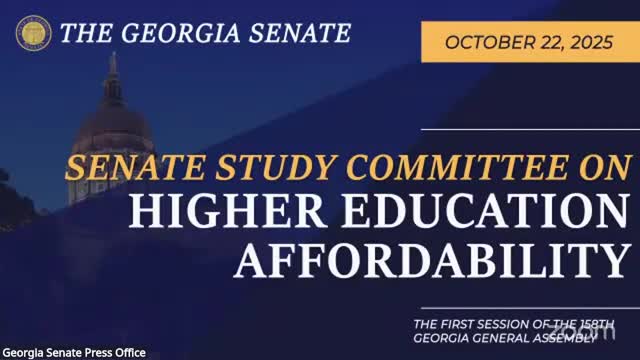Senate study committee weighs creating state need-based aid program using lottery reserves
Get AI-powered insights, summaries, and transcripts
Subscribe
Summary
A Georgia Senate study committee heard presentations and public testimony on expanding need-based financial aid, including a detailed $124 million proposal from the Georgia Budget and Policy Institute that would use lottery reserves to serve roughly 98,000 students.
A Senate study committee on postsecondary affordability heard Monday about proposals to create a state-run need-based grant program funded from the state's education lottery reserves, and officials described how such aid would narrow gaps in enrollment, persistence and student debt.
Chair Senator Nan Orrock opened the session at Georgia College and State University and framed the discussion around widening access and affordability. “We have learned that in Georgia ... we’re spending only 1% of that financial aid on needs based assistance,” Orrock said, summarizing earlier committee findings about Georgia’s low share of need-based spending.
The committee’s main policy presentation came from Ashley Young, senior education policy analyst at the Georgia Budget and Policy Institute (GBPI). Young recommended a comprehensive, annually renewable need-based grant administered by the Georgia Student Finance Commission and paid from education lottery reserves. GBPI’s proposal would cost approximately $124,000,000 per year and could support an estimated 98,019 students with the highest financial need, Young said. Under GBPI’s design, awards would be disbursed per credit hour (up to 30 credits per academic year) and tiered by Student Aid Index (SAI); the highest-need University System of Georgia (USG) recipients (SAI -1,500 to 0) would receive about $66.66 per credit hour (up to roughly $2,000 per year), and a second SAI band (0–6,000) would receive about $44.44 per credit hour (up to about $1,300). TCSG (technical college) awards in the plan were smaller but structured similarly.
Young noted that state lottery reserves are legally available for educational uses and cited the Georgia Revenues and Reserves Report showing education lottery reserves at roughly $2.5 billion with $1.6 billion categorized as unrestricted; the proposal’s cost, she said, could be covered without exhausting reserves.
GBPI argued the program should prioritize students at initial enrollment (first-year students), be automatically renewable, and not include a work or volunteer requirement. "Comprehensive need-based aid should not include a work requirement," Young said, citing peer-state practice and research showing work requirements can reduce access for the lowest-income students.
Presenters and committee members repeatedly contrasted Georgia’s historic reliance on merit scholarships — notably the HOPE and Zell Miller scholarships — with broad need-based models used by many other states. "We have learned that Georgia and New Hampshire [are the only two] that don't provide any significant financial aid that's needs based," Senator Orrock said, repeating points made earlier in the committee’s work.
Committee members pressed presenters on implementation details. Senator Max Burns asked about eligibility and whether awards would carry persistence requirements; Young answered that satisfactory academic progress (SAP) would be used to confirm continued eligibility. Members also debated whether the program should start by covering USG and TCSG students and later expand to private institutions; Young said the initial GBPI estimate focused on USG and TCSG to keep the entry point reasonable but that private institutions could be included in future iterations.
Supporters argued the state’s funding formula and institutional fees have transferred costs to students as state support declined. In discussion Senator Rick Williams said institutions have kept tuition relatively flat while fees and other living costs have increased; presenters and committee members agreed need-based grants must address total cost of attendance — not tuition alone.
Public comment and testimony from school counselors, financial aid directors and students underscored campus-level gaps: counselors described families surprised by bills for housing, food and fees that HOPE or Pell do not cover; university financial aid directors described small but meaningful numbers of students who could not register or move into residence halls without short-term institutional support; and students described taking multiple jobs or using loans to manage basic living costs.
Next steps: committee members asked presenters to provide follow-up data and said the panel will continue hearings. Senator Orrock announced the committee’s next meeting in Atlanta on Nov. 6 for additional testimony and policy work.
Ending: The hearing combined quantitative state-level proposals with numerous personal accounts from counselors, financial aid staff and enrolled students, framing the policy choice as whether Georgia will invest more of its lottery-funded aid in student need rather than largely in merit awards.
